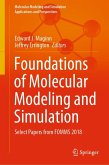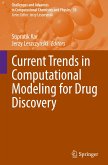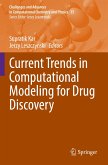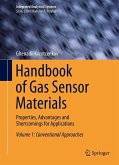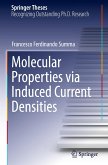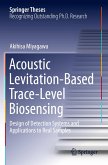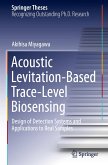Foundations of Molecular Modeling and Simulation
Select Papers from FOMMS 2018
Herausgegeben:Maginn, Edward J.; Errington, Jeffrey
Foundations of Molecular Modeling and Simulation
Select Papers from FOMMS 2018
Herausgegeben:Maginn, Edward J.; Errington, Jeffrey
- Broschiertes Buch
- Merkliste
- Auf die Merkliste
- Bewerten Bewerten
- Teilen
- Produkt teilen
- Produkterinnerung
- Produkterinnerung
This highly informative and carefully presented book comprises select proceedings of Foundation for Molecular Modelling and Simulation (FOMMS 2018). The contents are written by invited speakers centered on the theme Innovation for Complex Systems. It showcases new developments and applications of computational quantum chemistry, statistical mechanics, molecular simulation and theory, and continuum and engineering process simulation. This volume will serve as a useful reference to researchers, academicians and practitioners alike.
Andere Kunden interessierten sich auch für
![Foundations of Molecular Modeling and Simulation Foundations of Molecular Modeling and Simulation]() Foundations of Molecular Modeling and Simulation108,99 €
Foundations of Molecular Modeling and Simulation108,99 €![Current Trends in Computational Modeling for Drug Discovery Current Trends in Computational Modeling for Drug Discovery]() Current Trends in Computational Modeling for Drug Discovery177,99 €
Current Trends in Computational Modeling for Drug Discovery177,99 €![Current Trends in Computational Modeling for Drug Discovery Current Trends in Computational Modeling for Drug Discovery]() Current Trends in Computational Modeling for Drug Discovery177,99 €
Current Trends in Computational Modeling for Drug Discovery177,99 €![Handbook of Gas Sensor Materials Handbook of Gas Sensor Materials]() Ghenadii KorotcenkovHandbook of Gas Sensor Materials155,99 €
Ghenadii KorotcenkovHandbook of Gas Sensor Materials155,99 €![Molecular Properties via Induced Current Densities Molecular Properties via Induced Current Densities]() Francesco Ferdinando SummaMolecular Properties via Induced Current Densities93,99 €
Francesco Ferdinando SummaMolecular Properties via Induced Current Densities93,99 €![Acoustic Levitation-Based Trace-Level Biosensing Acoustic Levitation-Based Trace-Level Biosensing]() Akihisa MiyagawaAcoustic Levitation-Based Trace-Level Biosensing139,99 €
Akihisa MiyagawaAcoustic Levitation-Based Trace-Level Biosensing139,99 €![Acoustic Levitation-Based Trace-Level Biosensing Acoustic Levitation-Based Trace-Level Biosensing]() Akihisa MiyagawaAcoustic Levitation-Based Trace-Level Biosensing139,99 €
Akihisa MiyagawaAcoustic Levitation-Based Trace-Level Biosensing139,99 €-
-
-
This highly informative and carefully presented book comprises select proceedings of Foundation for Molecular Modelling and Simulation (FOMMS 2018). The contents are written by invited speakers centered on the theme Innovation for Complex Systems. It showcases new developments and applications of computational quantum chemistry, statistical mechanics, molecular simulation and theory, and continuum and engineering process simulation. This volume will serve as a useful reference to researchers, academicians and practitioners alike.
Produktdetails
- Produktdetails
- Molecular Modeling and Simulation
- Verlag: Springer / Springer Nature Singapore / Springer, Berlin
- Artikelnr. des Verlages: 978-981-33-6641-1
- 1st edition 2021
- Seitenzahl: 232
- Erscheinungstermin: 29. März 2022
- Englisch
- Abmessung: 235mm x 155mm x 13mm
- Gewicht: 359g
- ISBN-13: 9789813366411
- ISBN-10: 9813366419
- Artikelnr.: 63518575
- Herstellerkennzeichnung Die Herstellerinformationen sind derzeit nicht verfügbar.
- Molecular Modeling and Simulation
- Verlag: Springer / Springer Nature Singapore / Springer, Berlin
- Artikelnr. des Verlages: 978-981-33-6641-1
- 1st edition 2021
- Seitenzahl: 232
- Erscheinungstermin: 29. März 2022
- Englisch
- Abmessung: 235mm x 155mm x 13mm
- Gewicht: 359g
- ISBN-13: 9789813366411
- ISBN-10: 9813366419
- Artikelnr.: 63518575
- Herstellerkennzeichnung Die Herstellerinformationen sind derzeit nicht verfügbar.
Prof. Edward Maginn is the Keough-Hesburgh Professor in the department of chemical and biomolecular engineering at the University of Notre Dame. He received his B.S. in chemical engineering from Iowa State University and his Ph.D. in chemical engineering from the University of California, Berkeley. His research focuses on the development and use of atomistic molecular dynamics and Monte Carlo simulation methods to study the thermodynamic and transport properties of materials, with special emphasis on ionic systems important in energy and environmental applications. He has won a number of awards, including the Early Career Award from the Computational Molecular Science and Engineering Forum of the American Institute of Chemical Engineers, the American Society for Engineering Education Dow Outstanding New Faculty Award, the BP College of Engineering Outstanding Teacher Award and the National Science Foundation Career award. He is a Fellow of the American Association for the Advancement of Science and the American Institute of Chemical Engineers and is a trustee and president of the non-profit CACHE (Computer Aids for Chemical Engineering) Corporation. Prof. Jeffrey Errington is a Professor within the Department of Chemical and Biological Engineering at the University at Buffalo. He also serves as the Associate Dean for Undergraduate Education within the institution's School of Engineering and Applied Sciences. Errington joined the University at Buffalo in 2001 after receiving his B.S. in chemical engineering from the University at Buffalo, a Ph.D. in Chemical Engineering from Cornell University, and subsequently studying as a post-doctoral fellow within the Department of Chemical Engineering at Princeton University. His research focuses on the development and application of atomistic molecular simulation methods to study the phase and interfacial behaviors of complex fluids. Current projects focus on the prediction of interfacial properties associated with carbon dioxide sequestration, understanding wetting phenomena related to enhanced oil recovery, and probing the phase and interfacial behaviors of room temperature ionic liquids. His research group is also active in the development of free-energy-based molecular simulation methods for computing the interfacial properties of model systems. He is a Trustee of CACHE (Computer Aids for Chemical Engineering) Corporation, member of the American Chemical Society, and a senior member of the American Institute of Chemical Engineers, where he serves as the Past-Chair of the Computational Molecular Science and Engineering Forum (CoMSEF).
Strain Controlling Catalytic Efficiency of Water Oxidation for Ni1-xFexOOH alloy.- The Role of Entropy in the Structural Transitions in Zeolitic Imidazolate Frameworks.- Coarse-grained modeling and simulations of thermoresponsive biopolymers and polymer nanocomposites with specific and directional interactions.- Dissipative Particle Dynamics Approaches to Modeling the Self-Assembly and Morphology of Neutral and Ionic Block Copolymers in Solution.- The Statistical Mechanics of Solution-phase Nucleation: CaCO3 Revisited.- Efficient Sampling of High-Dimensional Free Energy Landscapes: A Review of Parallel Bias Metadynamics.
Strain Controlling Catalytic Efficiency of Water Oxidation for Ni1-xFexOOH alloy.- The Role of Entropy in the Structural Transitions in Zeolitic Imidazolate Frameworks.- Coarse-grained modeling and simulations of thermoresponsive biopolymers and polymer nanocomposites with specific and directional interactions.- Dissipative Particle Dynamics Approaches to Modeling the Self-Assembly and Morphology of Neutral and Ionic Block Copolymers in Solution.- The Statistical Mechanics of Solution-phase Nucleation: CaCO3 Revisited.- Efficient Sampling of High-Dimensional Free Energy Landscapes: A Review of Parallel Bias Metadynamics.


